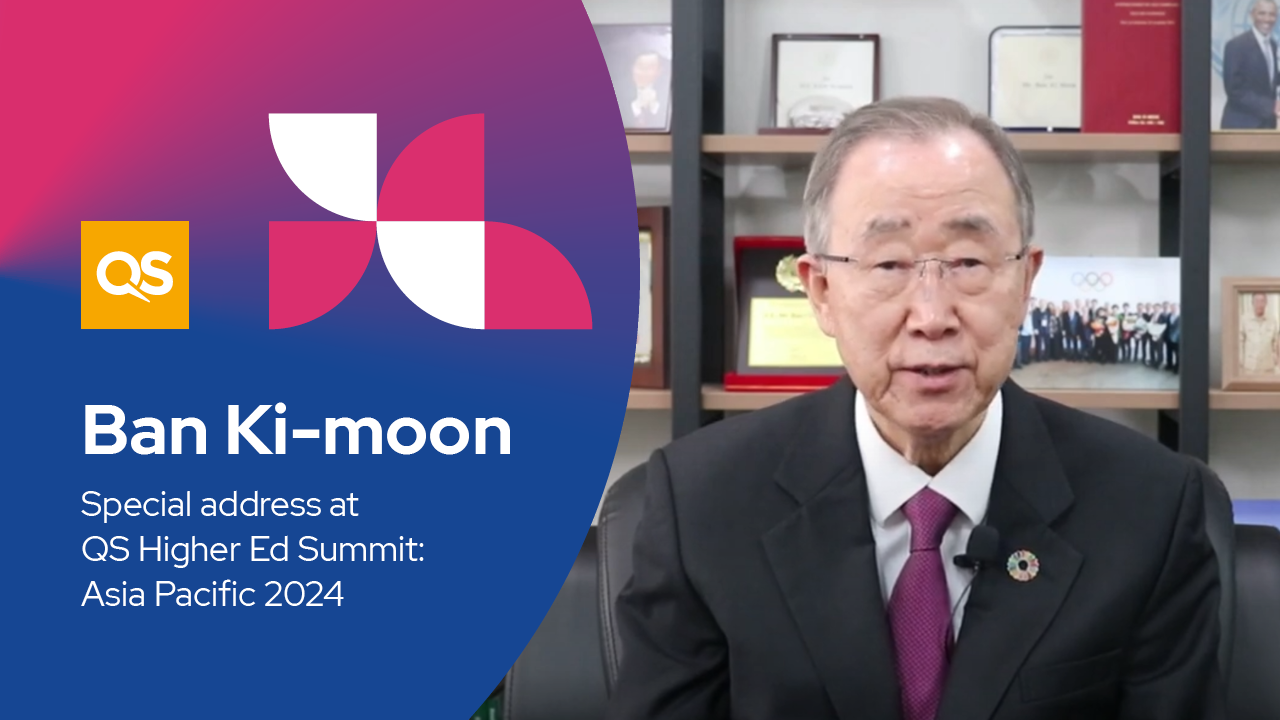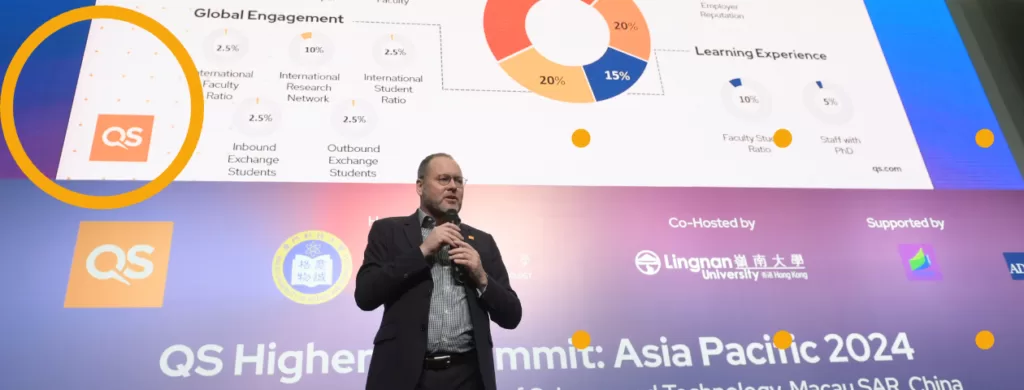
This week, we celebrated the 20th anniversary of the QS Higher Ed Summit: Asia Pacific with an incredible line-up of keynote speakers and panels in Macau.
Among the many highlights was an inspirational video message from former UN Secretary General Ban Ki-moon.
In his message to the 1,200+ delegates at the QS Higher Ed Summit: Asia Pacific 2024, he spoke about the pivotal role of higher education in driving change, saying: “Education acts as a catalyst for positive change driving progress across all of the SDGs at the same time, universities can also play a key role because they deliver excellent education, nurture talent, expand research and provide unique opportunities for collaborations across cultures, geographies and sectors.”
Watch his message in full and read the transcript below.
Throughout the Summit – hosted by Macau University of Science and Technology – visionary leaders from the Asia-Pacific region convened to examine the essential role of higher education partnerships in tackling the world’s pressing challenges.
Discussions explored fostering meaningful collaborations between universities, governments, and industry partners; addressing global challenges and emerging opportunities, and aligning curricula with the global skills gap.
Ban Ki-moon, a South Korean politician and diplomat, served as the eighth Secretary-General of the United Nations from 2007 to 2016. Before this role, he was South Korea’s Minister of Foreign Affairs and Trade from 2004 to 2006.
He concludes his message with a thank you to all who make the QS Higher Ed Summit possible: “I’d like to reiterate my heartfelt congratulations to the successful organisation of the QS Higher Ed Summit: Asia Pacific 2024 in advancing the transformational power of education to help achieve these noble goals.”
I extend my warmest congratulations on the occasion of the QS Higher Ed Summit: Asia Pacific 2024 and it is my privilege to speak to you today at such a vital juncture. Now is a critical time to advance quality education, to achieve sustainable development, expand climate action, build peace and empower human rights. In this regard, I firmly believe this is our moment to accelerate action on the UN’s global goals and illuminate a dynamic future for all people and the planet. Indeed, we stand on the precipice of a period of pronounced change – one that will have profound implications for our society’s economies, planet and the future of humanity.
My gratitude goes to Chairman of Elsevier, Youngsuk “YS” Chi for his hard work and leadership in organising this summit to empower action in the sphere of higher education. Now more than ever, we need global solutions underpinned with education and solidarity to empower the leaders and global citizens of both today and tomorrow to rise to the occasion and ensure a sustainable and peaceful future.
During my time as United Nations Secretary General, I brought the entire world together to agree to the UN Sustainable Development Goals adopted by 193 member states in New York in 2015. The SDGs offer us a way forward to solve the most critical issues of our time. These include poverty, hunger, health, education, inequality, climate action, gender equality and others. The SDGs provide humanity and our planet with a collaborative blueprint to ensure the future we want.
Today, 9 years since their adoption, the SDGs have made notable progress on the ground. This is true in terms of maternal mortality rates, combating poverty and hunger and improving water and sanitation globally. But progress is stalled on other SDGs, with some sectors and geographic areas doing better than others. Conflict, the climate crisis and COVID-19 have all led to troubling reversals in SDG implementation on the ground. With just over five years to their 2030 target, no country is on track to achieve all of the SDGs at the moment.
The new global Sustainable Development Report 2024 summarises that only 16% of the SDGs target are on track to be met globally by 2030 with the remaining 84% showing limited progress or a reversal of progress. But we must keep moving forward together, and the transformational SDGs can still bring us together to chart a sustainable, resilient future for all of humanity and the planet. We must regroup, rejuvenate and forge ahead under the spirit of cooperation, partnership and solidarity. This is how Asia and the world can leave no one behind.
With doubling our common efforts on key goals like SDG 4 on Quality Education, SDG 3 on Good Health and Well-being, and SDG 5 on Gender Equality, can help the international community get back on track. Education particularly is fundamental to achieving the Sustainable Development Goals, as it is the enabling cornerstone of our sustainable development efforts, in that it synergises gains across each of the other SDGs. This is because education equips individuals with the knowledge, skills and values needed to better themselves, improve their communities and address global challenges.
Education has a transformative effect on progress towards empowerment, inclusion and equality for all. For example, education trains future professionals to solve conflicts, build institutions and uphold the rule of law. Education expands decent work and spurs economic growth across all sectors. Education can expand gender equality and women’s empowerment in both developed and developing countries. Education promotes economic growth, reduces inequalities and forces innovation. Also, education is key to empowering communities to proactive steps toward taking urgent climate action, protecting the planet and promoting sustainable practices.
In addition, education forced us global citizenship, educating individuals to understand and engage with global challenges like climate change, conflict and inequality. By enhancing people’s capabilities, education enables them to contribute effectively to sustainable development in various sectors, from health and agriculture to energy and governance.
Overall, education acts as a catalyst for positive change driving progress across all of the SDGs at the same time, universities can also play a key role because they deliver excellent education, nurture talent, expand research and provide unique opportunities for collaborations across cultures, geographies and sectors.
Indeed, universities across the globe place a high priority on delivering real world impact at both the global and local levels. This can clearly be seen through the vital societal, economic, environmental and health contributions that universities make all over the world. In this era of increasing divisions and uncertainty, we must all work together to promote sustainable development and prosperity, achieve deeper mutual understanding, protect our planet and build peace for the next generation.
Education holds the key to doing all of this. I highly commend your ongoing efforts in this regard. Before concluding, I’d like to reiterate my heartfelt congratulations to the successful organisation of the QS Higher Ed Summit: Asia Pacific 2024 in advancing the transformational power of education to help achieve these noble goals.



